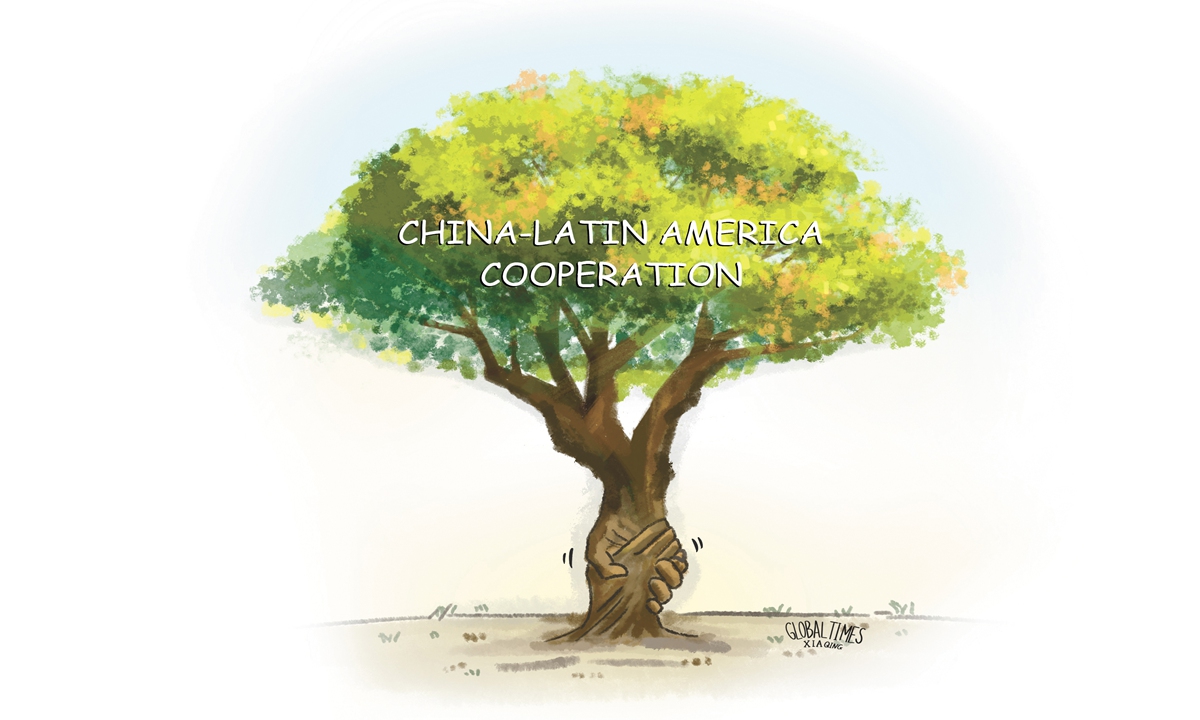Why China-CELAC Beijing Declaration has earned warm applause: Global Times editorial

Illustration: Xia Qing/GT
At the historic fourth ministerial meeting of the China-CELAC (the Community of Latin American and Caribbean States) Forum, participating countries jointly adopted the Beijing Declaration, drawing widespread attention not only from the Global South but also from the broader international community. Brazilian President Luiz Inácio Lula da Silva praised the declaration as a source of encouragement for developing countries in Latin America and the Caribbean (LAC). Lula said it brings hope and shows that economically strong countries like China are considering how to contribute to the development of the world's poorest nations. Renowned Brazilian journalist Leonardo Attuch remarked that the declaration opens a historic window for Latin America to reshape its future. It symbolizes a new world emerging from the collapse of the imperialist order - one that rebuilds international relations on the foundations of fairness, respect and national self-determination, according to him.Why, then, has the Beijing Declaration received such enthusiastic applause from the LAC countries? The answer lies within the declaration itself. In this document of over 2,600 Chinese characters, the word "development" appears 19 times, "cooperation" 18 times, and "fairness," "justice," or "equality" eight times. Behind these key words is a resonance of values, representing the common values that China and LAC countries follow, as well as the reasons for both sides to work together in the changing international situation. At a moment when Global South nations are eager to speak, to be heard and realize their long-standing aspirations, the Beijing Declaration articulates those hopes clearly and vividly.
The Beijing Declaration is a manifesto from the Global South for building a more just world, and it deserves close and careful reading by anyone seeking to understand the Global South. It conveys a message of peace, affirms the importance of upholding international law and promoting the purposes and principles of the UN Charter, and supports resolving differences, disputes, and conflicts through peaceful means. It reflects the sense of responsibility of the Global South, emphasizing that global economic governance must address the common concerns of all countries, especially developing ones, and reaffirms support for a fair, transparent, and rules-based multilateral trading system. Filled with the enthusiasm for cooperation, it expresses a willingness to enhance intergovernmental dialogue and deepen mutual learning and exchange in areas such as infrastructure, connectivity, scientific and technological innovation, energy transition, and poverty reduction. It represents the direction of the future, advocating for the building of a peaceful world and the promotion of inclusive, mutually beneficial, and win-win economic globalization. This declaration leads the times, reflecting how China and LAC countries, in the face of changes in the world, our era, and history, consciously respond with a proactive sense of historical responsibility.
A small detail reveals the values represented by the Beijing Declaration - its mention of the Haitian issue. As the first Latin American country to declare independence, Haiti has long suffered misfortunes due to military occupations and external interference, and the suffering of the Haitian people elicits deep sympathy. Even though Haiti has not yet established diplomatic relations with China, the Beijing Declaration pledges to work with the international community and the UN to assist Haiti in rebuilding a secure environment through a comprehensive development approach. This method of resolving social contradictions through "comprehensive development" is not only a concrete approach to the Haitian issue, but also embodies an innovative model of international cooperation, offering valuable experience and insight for other countries facing similar development and security challenges. In today's international community, the root causes of many regional conflicts and instabilities are often closely linked to underdevelopment. From the perspective of the Haitian issue, one can clearly sense the broader significance of the Beijing Declaration.
China-LAC interactions and cooperation are uniquely representative in the collective rise of countries in the Global South. As developing countries that have both experienced colonial rule, China and the countries of CELAC share a natural common vision for achieving independence and revitalization. From the trade volume first exceeding $500 billion to the commissioning of the Chancay port, from the formulation of China-CELAC joint action plan for cooperation in key areas (2025-27) to the launch of the five programs, today, the establishment of a multidimensional deep cooperation network between China and LAC countries, along with its numerous fruitful outcomes, proves that by escaping the trap of dependency development dominated by hegemony, countries in the Global South can forge a vibrant path of development and revitalization through mutually respectful, equal, and mutually beneficial pragmatic cooperation.
The Beijing Declaration sends an important signal. President Xi Jinping profoundly stated, "China and LAC countries are important members of the Global South. Independence and autonomy are our glorious tradition. Development and revitalization are our inherent right. And fairness and justice are our common pursuit." In the future, China and LAC countries will continue to support each other on issues that involve each other's core interests and major concerns, firmly uphold the multilateral trading system, maintain the stability and smooth operation of global industrial and supply chains, and preserve an open and cooperative international environment. Together, we will address global challenges, and the tree of China-LAC cooperation will flourish with even greater vitality.



